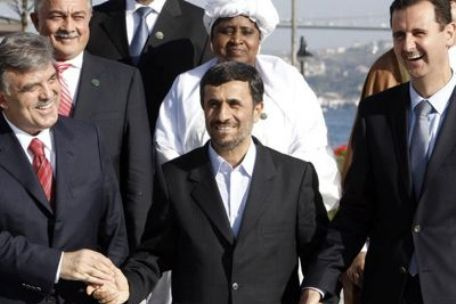Iran-Turkey’s Role in Solving the Syrian Crisis

By: Kayhan Barzegar
The Western and U.S. policy in support of regime change in Syria, followed by Turkey, will lead to the creation of a rival political-security block between Iran and Turkey thereby weakening any cooperation efforts in the context of regional peace and security. This policy endangers both regional and international peace and security.
By linking the political change in Syria as a crucial step to intensify political pressure on Iran to change its regional policies and even its nuclear ones, this policy has enabled Iran’s rivals and adversaries such as Saudi Arabia and Israel to interfere in the crisis, thereby turning the issue of regime change in Syria into a zero sum game and precisely against Iran’s geopolitical interests.
With such policy, the rival actors have introduced Iran as the main obstacle for bringing change to Syria, thus somehow connecting the crisis with the usual rhetoric of the conservative Arab regimes and Israel, to wit, the necessity of blocking Iran's increased influence and role in the region. Therefore, Iran ultimately had no choice other than to choose between supporting Assad’s regime or to face a pro-western and a conservative pro-Arab regime in Syria which can imperil Iran's balance of power interests in the region.
Iran’s regional policy is focused on strengthening “alliances and coalitions” with friendly factions and states in the region. Turkey’s retreat from playing a mediatory role and the "zero problems" policy as well as taking a biased position in the Syrian crisis is all against Iran's regional policy of preserving the current regional balance of power.
From Iran’s perspective, the future political architecture of the Syrian government, being of significant importance to Iran's rivals, is noteworthy as to preserving and increasing Iran's regional role, the future balance of power, and strengthening Iran’s friends and allies such as Hezbollah in the region. In this respect, Iran successfully managed to get Russia’s support. For the Russians, playing an active role in the Syrian crisis is an opportunity to strengthen Russia’s regional role, as well as challenging the West in regards to the employment of the Anti Missile Shield in Turkey.
The line of geopolitical discrepancy between Iran and Turkey is the issue of possible “military intervention" in Syria--either by Turkey or the West and NATO. Despite its rhetorical and symbolic policies, Turkey lacks the ability to convince its public of any military intervention in Syria. Without Turkey's military intervention, the possibility of NATO’s attack against Syria faces serious doubts. Therefore, waging a new war without the required legitimacy and support of the public in the Middle East would be disastrous for the West.
Unlike some western analyses that regard Turkey as the winner and Iran as the loser of the Arab Spring, the role and importance of these two players are not yet fully determined, depending more on their future policies in the region and particularly in Syria, along with the way the Arab public will perceive the role of these two players.
Experience shows that the Arab world will resist accepting the “big brother” models, such as a moderate Islamist or secular Turkey. Meanwhile, different political factions, especially secularists in Turkey, strongly oppose Turkey’s deep involvement in the Arab Spring, considering it beyond Turkey's actual political-strategic and economic potentials. Although some layers of Arab societies favor the Turkish model, this model simultaneously faces serious challenges by the ideological trends in the region.
In contrast, Iran along with the concept of the “Arab Spring" focusing on anti-autocratic aspects of the Arab peoples' movements, focuses on the concept of the "Islamic awakening” stressing these movements’ ideological and Islamic values, leading to an increase in its political-ideological clout upon large segments of the Arab public. In this respect, several conferences, aimed at strengthening the latter theme were recently held in Tehran.
Yet the real difference between Iran and Turkey, is not to institutionalize their political-ideological model, rather it is to preserve their geopolitical interests and regional roles. In such circumstances, the West's policy regarding the immediate regime change in Syria creates a geopolitical discrepancy between Iran and Turkey which not only endangers regional peace and security, but affects other regional peace and security efforts i.e., in Afghanistan and Iraq. A vivid example is Iran's lukewarm appreciation of the Istanbul Conference regarding Afghanistan's peace and security, held recently in Turkey.
The West should focus on the gradual change in dealing with the Syrian crisis and increased cooperation between Iran and Turkey in order to find middle-ground for solving the crisis. Such a policy brings more reliable prospects for regional peace and security especially by avoiding the possibility of spreading sectarian strife.
Here, Turkey, by assuring that it would not take part in any military intervention in Syria can take a positive step, whereas Iran can use its influence to convince the Assad regime to take genuine measures for bringing meaningful changes, alongside moving towards holding free elections in the near future. Through such a policy, the necessary ground will be prepared to reach a sustainable agreement regarding the future political architecture in Syria and the real demands of the people.
Source: IMESS

